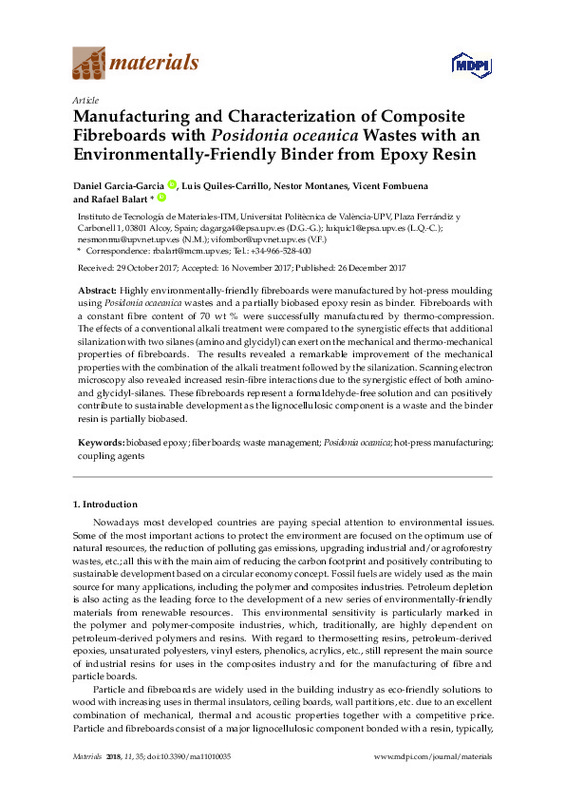JavaScript is disabled for your browser. Some features of this site may not work without it.
Buscar en RiuNet
Listar
Mi cuenta
Estadísticas
Ayuda RiuNet
Admin. UPV
Manufacturing and Characterization of Composite Fibreboards with Posidonia oceanica Wastes with an Environmentally-Friendly Binder from Epoxy Resin
Mostrar el registro completo del ítem
Garcia-Garcia, D.; Quiles-Carrillo, L.; Montanes, N.; Fombuena, V.; Balart, R. (2018). Manufacturing and Characterization of Composite Fibreboards with Posidonia oceanica Wastes with an Environmentally-Friendly Binder from Epoxy Resin. Materials. 11(1). https://doi.org/10.3390/ma11010035
Por favor, use este identificador para citar o enlazar este ítem: http://hdl.handle.net/10251/103639
Ficheros en el ítem
Metadatos del ítem
| Título: | Manufacturing and Characterization of Composite Fibreboards with Posidonia oceanica Wastes with an Environmentally-Friendly Binder from Epoxy Resin | |
| Autor: | ||
| Entidad UPV: |
|
|
| Fecha difusión: |
|
|
| Resumen: |
[EN] Highly environmentally-friendly fibreboards were manufactured by hot-press moulding using Posidonia ocaeanica wastes and a partially biobased epoxy resin as binder. Fibreboards with a constant fibre content of 70 wt ...[+]
|
|
| Palabras clave: |
|
|
| Derechos de uso: | Reconocimiento (by) | |
| Fuente: |
|
|
| DOI: |
|
|
| Editorial: |
|
|
| Versión del editor: | http://doi.org/10.3390/ma11010035 | |
| Código del Proyecto: |
|
|
| Agradecimientos: |
This work was supported by the Ministry of Economy and Competitiveness-MINECO [MAT2014-59242-C2-1-R]. D. Garcia-Garcia wants to thank the Spanish Ministry of Education, Culture and Sports for the financial support through ...[+]
|
|
| Tipo: |
|









